
Spontaneous toothache, severe sensitivity to hot and cold foods, severe decay or an injury that creates an abscess (infection) in the bone requires removal of the infected or irritated nerve tissue that lies within the root of the tooth.
Root canal treatment involves removing the infected pulp, cleaning and sealing of the root canal with a sterile, plastic material, called gutta percha. This is done in order to prevent possible future infection. Root canal treated teeth usually requires crown to protect them from fracture.

The loss of a single tooth can have a major impact on your dental health and personal appearance. When one or more teeth are missing, the remaining teeth can shift out of their normal position thereby disturbing the teeth equilibrium. These teeth are often more susceptible to decay and gum disease because they are more difficult to clean around.
A bridge consists of a replacement tooth/teeth attached to crowns on each side. The bridge is cemented to the teeth adjacent to the space, effectively replacing the missing tooth and preventing any shifting. Crown and bridge are made up of different materials like full porcelain, porcelain fused to metal and all metal.
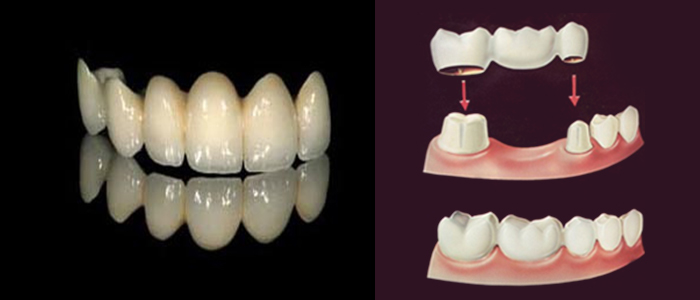
A dental Implant is an artificial tooth root replacement made up of titanium & shaped like a screw. They are made up of titanium as it biologically bonds to bone. They are placed into the bone in a relatively pain-free procedure .Given proper care; dental implants can give a lifetime satisfaction.
Depending upon the time duration dental implants can be put under two categories:-
*Immediate loading in which the patient can get the crown within 3-4 days after the implant placement and sometimes immediately after the implant placement (on the same day).
*Delayed loading in which the patient has to wait for a period of 3-4 months to get the crown after implant placement.
Being oral and Maxillo-facial surgeon we have placed dental implants even in very challenging situations and we have done a lot of research work on dental implants which we have even published in various national and international journals.

Paediatric dental care is essential for giving children the proper foundation for a healthy life, from childhood through adolescence and beyond. Common paediatric treatment involves-
Preventive Dentistry:-
Today we live in society inspired by beauty and smile. So, a beautiful smile is a great asset which one can ever have. Smile correction can be beautifully achieved with modern dentistry because of its technological advancements and enormous variety of dental materials.
We improve your smile by-
Orthodontic treatment can tremendously change your world. A beautiful smile changes every aspect of your life both, professionally and personally. It can be said that nearly 30% of the population presents with crooked teeth severe enough to benefit from orthodontic treatment.
With the availability of technical advancements in orthodontic systems we can create beautiful smile in adults without the awkwardness of conventional braces.
Orthodontic treatment like braces helps move teeth that are crooked or that do not fit together right. By fixing these problems your mouth can be maintained healthy. Crooked teeth can be harder to clean, putting you at risk for cavities and gum disease.
We provide orthodontic treatment such as tooth coloured braces (Invisible braces), lingual orthodontics and straight wire appliance to our patients.

Oral & Maxillofacial surgery (OMS or OMFS) specializes in treating many diseases, injuries and defects in the head, neck, face, jaws and the hard and soft tissues of the Oral (mouth) and Maxillofacial (jaws and face) region. It is an internationally recognized surgical specialty. In some countries around the world, including the United States, Canada, Australia, and Israel, it is a recognized specialty of dentistry; in others, such as the UK and most of Europe, it is recognized as both a specialty of medicine and dentistry and a dual degree in medicine and dentistry is compulsory.
Orthognathic surgery is performed by an oral and maxillofacial surgeon and it is done to correct a wide range of minor and major skeletal and dental irregularities, including the misalignment of jaws and teeth. Surgery can improve chewing, speaking and breathing. The patient's appearance may be dramatically enhanced as a result of this surgery. Orthognathic surgery is also performed to correct functional problems.
Following are some of the conditions that may indicate the need for corrective jaw surgery:
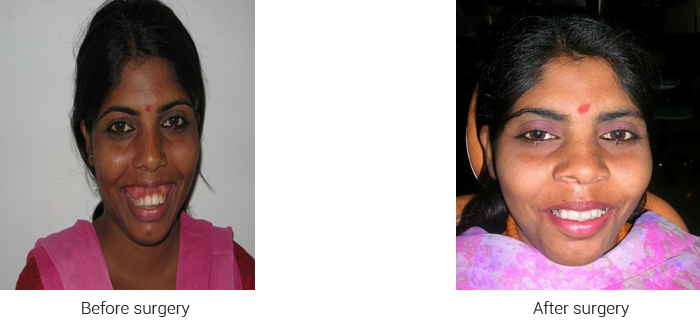
TMJ (temporomandibular joint) disorders are a family of problems related to your complex jaw joint. If you have had symptoms like pain or a "clicking" sound, you'll be glad to know that these problems are more easily diagnosed and treated than they were in the past. Since some types of TMJ problems can lead to more serious conditions, early detection and treatment are important. No one treatment can resolve TMJ disorders completely and treatment takes time to be effective.
TMJ disorders develop for many reasons. You might clench or grind your teeth, tightening your jaw muscles and stressing your TM joint. Or, you may have a damaged jaw joint due to injury or disease. Whatever the cause, the patient usually has pain, clicking or grating noises when you open your mouth, or trouble opening your mouth wide.
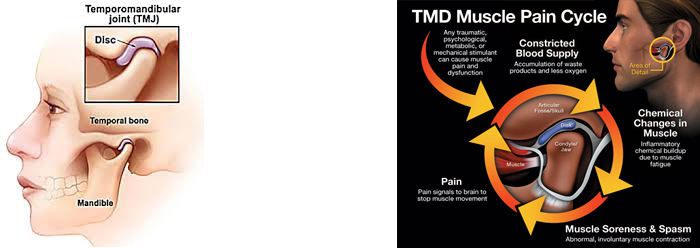
By the age of 18, the average adult has 32 teeth; 16 teeth on the top and 16 teeth on the bottom. Each tooth in the mouth has a specific name and function. The teeth in the front of the mouth (incisors, canine, and bicuspid teeth) are ideal for grasping and biting food into smaller pieces. The back teeth (molar teeth) are used to grind food up into a consistency suitable for swallowing.
Due to evolution the average mouth size is decreasing and in most of the individuals the average mouth cannot accommodate more than 28 teeth. It can be painful when 32 teeth try to fit in a mouth that holds only 28 teeth. These four other teeth are your third molars, also known as "wisdom teeth."
Wisdom teeth are the last teeth to erupt. When they align properly and gums around the teeth are healthy wisdom teeth do not have to be removed. Unfortunately, this does not generally happen. The extraction of wisdom teeth is necessary when they are prevented from properly erupting within the mouth. They may grow sideways, partially emerge from the gums, and even remain trapped beneath the gums and the bone. Impacted teeth can take many different positions in the bone as they attempt to find a pathway that will allow them to successfully erupt.
These poorly positioned/erupted impacted teeth can cause many problems. When they are incompletely erupted, the opening around the teeth allows bacteria to grow and will eventually cause an infection. This may result in swelling, stiffness, pain, and illness. The pressure from the erupting wisdom teeth may move other teeth and disrupt the natural alignment of teeth. The most serious problem occurs when tumours or cysts form around the impacted wisdom teeth results in the destruction of the jawbone and healthy teeth. Removal of the offending impacted teeth usually resolves these problems. Early removal is recommended to avoid such future problems and to decrease the surgical risk involved with this procedure.

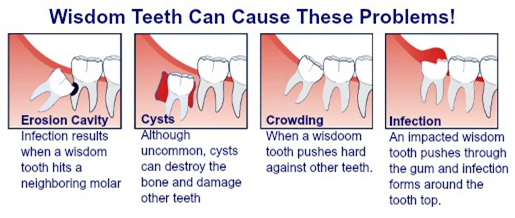
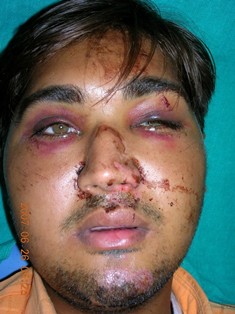 Facial trauma, also called maxillofacial trauma, is any physical trauma to the face .Facial trauma can involve soft tissue injuries such as lacerations and bruises, or fractures of the facial bones such as fractures of the jaw, cheek bone (zygomatic bone fracture).We as an Oral and Maxillofacial Surgeon are expertise in treating and repairing such injuries. Our knowledge of how jaws come together (dental occlusion) is critical when repairing complex facial fractures.
Facial trauma, also called maxillofacial trauma, is any physical trauma to the face .Facial trauma can involve soft tissue injuries such as lacerations and bruises, or fractures of the facial bones such as fractures of the jaw, cheek bone (zygomatic bone fracture).We as an Oral and Maxillofacial Surgeon are expertise in treating and repairing such injuries. Our knowledge of how jaws come together (dental occlusion) is critical when repairing complex facial fractures.
 Tobacco chewing can result in variety of oral and mucosal diseases like oral mucositis, smoker's palate, leukoplakia, erythroplakia, oral sub mucous fibrosis and many other oral diseases. Few of these diseases are classified under premalignant lesions and premalignant conditions so; if they are diagnosed early these premalignant diseases may not finally convert into malignancy. Many of these premalignant lesions or conditions can be managed conservatively or few of them may just require minor surgery thus saving the patient from being converted into full blown oral malignancy/oral cancer.
Tobacco chewing can result in variety of oral and mucosal diseases like oral mucositis, smoker's palate, leukoplakia, erythroplakia, oral sub mucous fibrosis and many other oral diseases. Few of these diseases are classified under premalignant lesions and premalignant conditions so; if they are diagnosed early these premalignant diseases may not finally convert into malignancy. Many of these premalignant lesions or conditions can be managed conservatively or few of them may just require minor surgery thus saving the patient from being converted into full blown oral malignancy/oral cancer.




